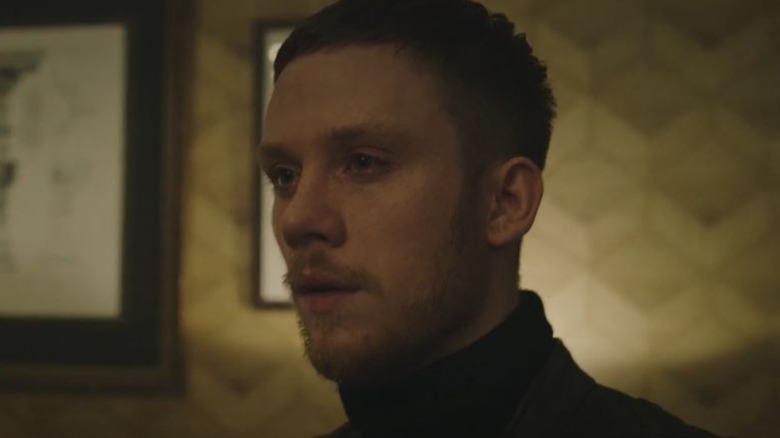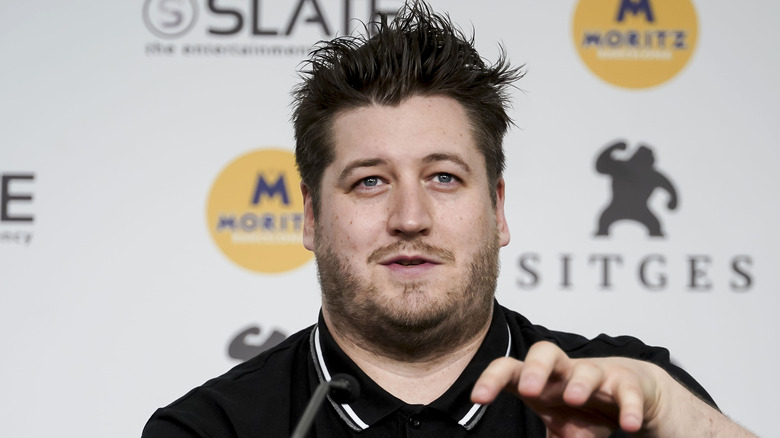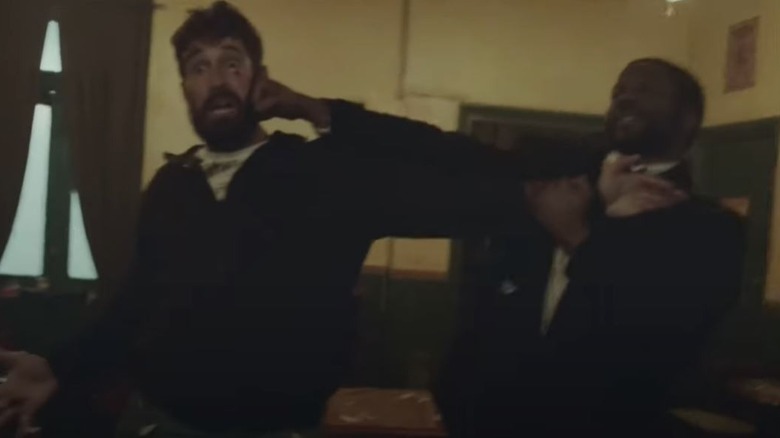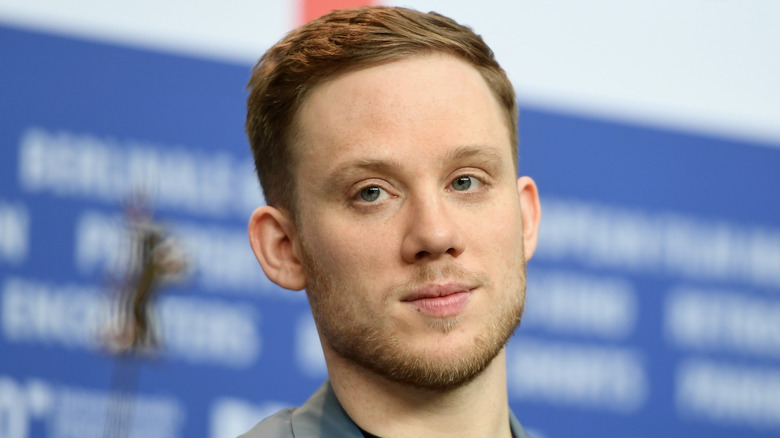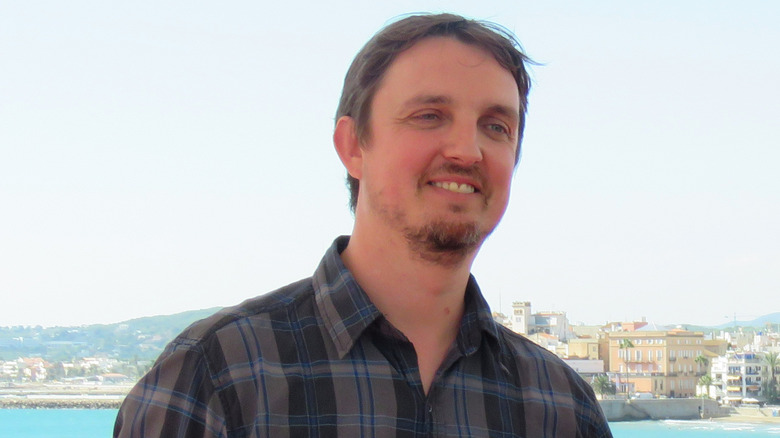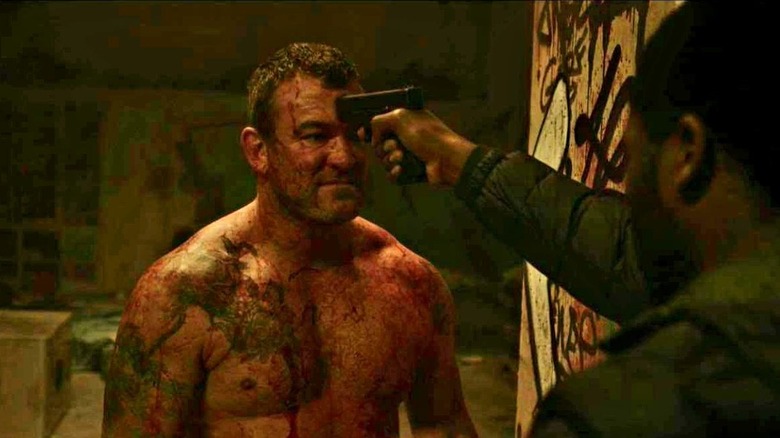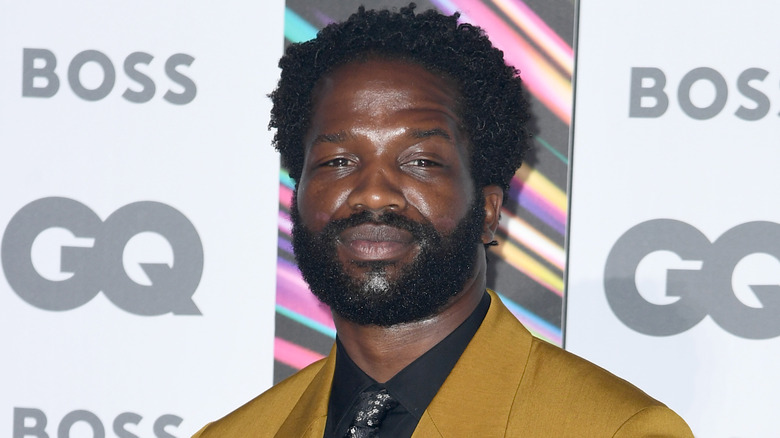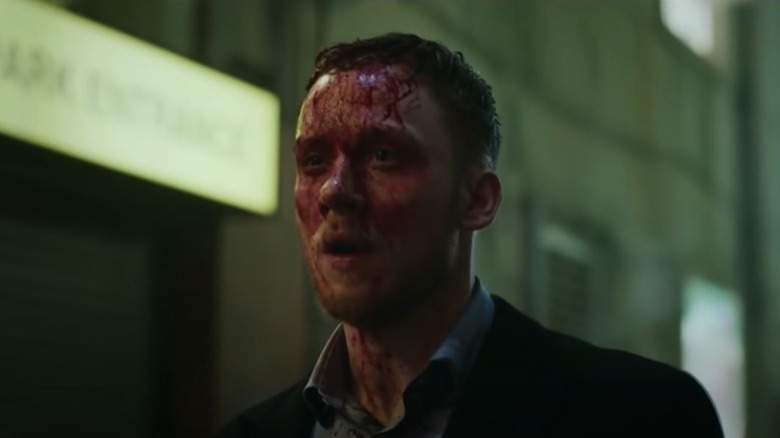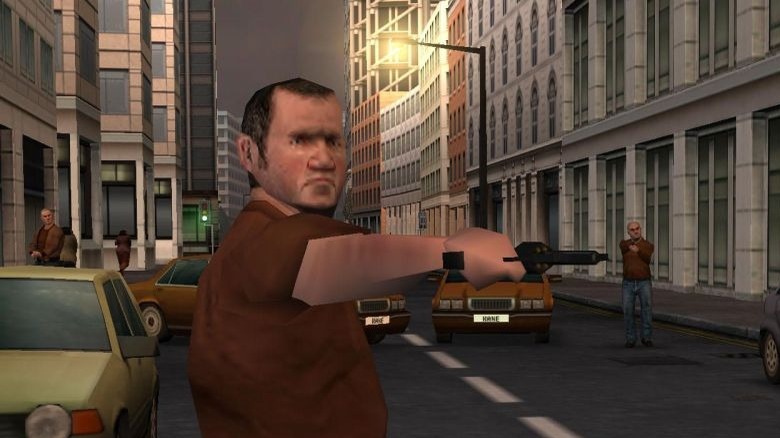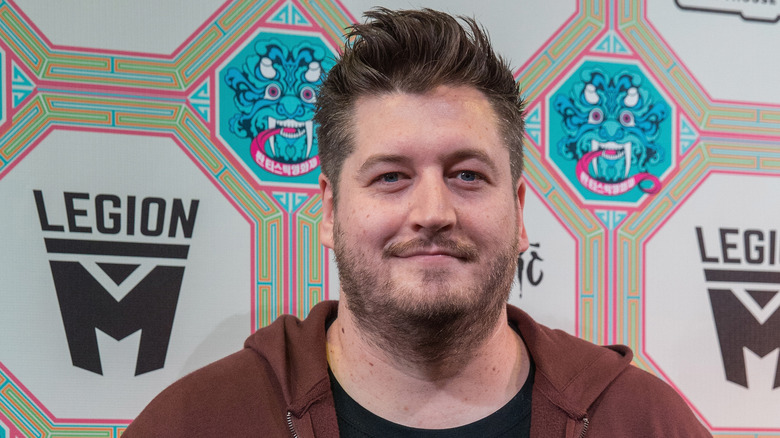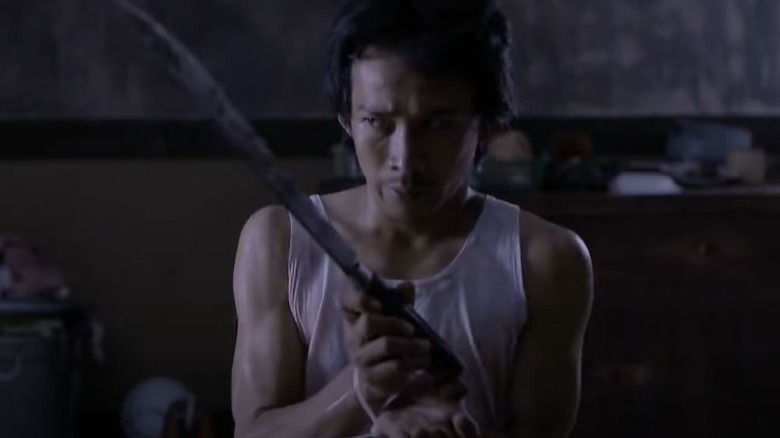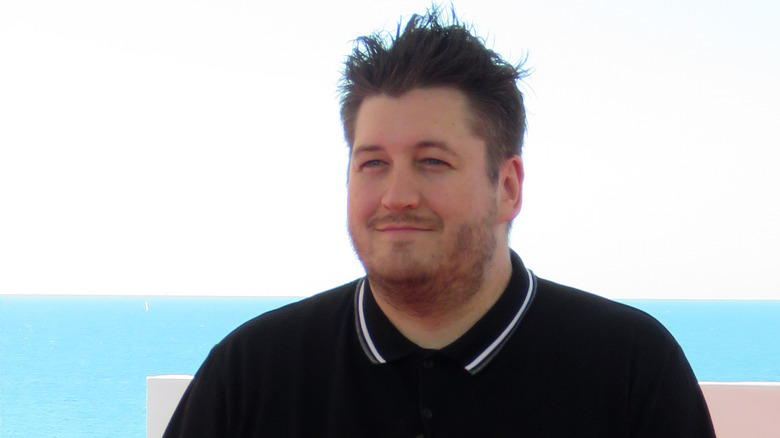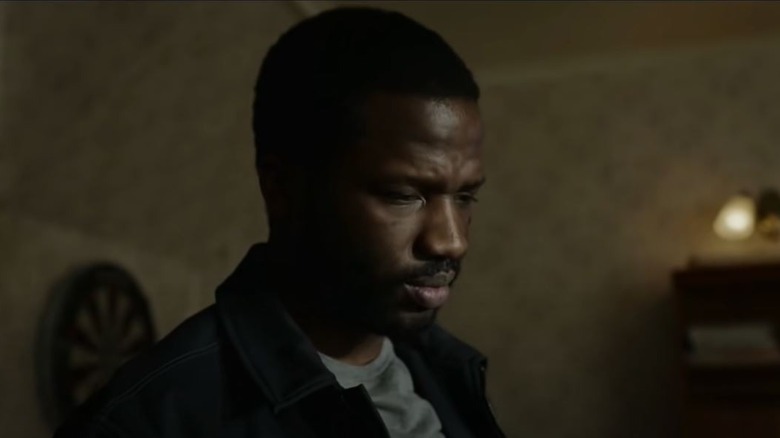The Untold Truth Of Gangs Of London
A dangerous power vacuum is formed after the death of the Wallace family patriarch, leaving every gang in London scheming to seize control of the city. Large in scope yet intimate in the familial details of the city's top crime family, "Gangs of London" chronicles a modern-day crime saga with a Shakespearean flair for tragedy. Co-created by the team of Gareth Evans and Matt Flannery, who cut their teeth making martial-arts-centric action films, this Sky TV series has no shortage of brutal fight scenes and shootouts. The action in "Gangs of London" feels unlike any television action to come before it, but why?
The production style of this series is distinctly removed from the typical television production style. The nine-episode first season of "Gangs of London" was released as a Sky original in the UK and was made available to US audiences a couple of months later through the newly launched AMC+ streaming service. There's plenty to explore behind the scenes of this unique gangster series from unusual audition stories to doubts from the show's creator. This is the untold truth of "Gangs of London."
Gareth Evans got his big break making movies in Indonesia
Gareth Evans was born in Hirwaun, South Wales and spent the early stages of his life in the UK, including some time in London where the series is set. While living in the UK, Evans made a number of short films that haven't seen the light of day (via Radio Times) and even self-funded his debut feature film, a low-budget thriller called "Footsteps" — but it wasn't until he immigrated to Indonesia that his film career took off. His first Indonesian-language martial arts film, "Merantau," made a splash, but it was his follow-up action film, "The Raid: Redemption," that rocketed Evans to international attention.
Evans wasn't the only one to receive a massive profile boost from "The Raid" and its sequel "The Raid 2: Berandal." Stars Iko Uwais, Joe Taslim, and Yayan Ruhian — who also served as the fight choreographer for both "Raid" films — have all gone on to appear in international projects. On a grander scale, the entire Indonesian film industry benefited from the popularity of the "Raid" films. The smash-hit success of "The Raid" was sure to "raise the international profile of Indonesian cinema," according to the Wall Street Journal. Evans returned to the UK where he made the horror film "Apostle" before co-creating "Gangs of London," which he also executive produced and directed the first and final episodes of.
The action scenes are shot unlike any other TV show
Coming from a director known for stylized, bloody martial arts fight scenes, it was all but guaranteed that "Gangs of London" would be packed with action as well. What wasn't as certain was if the action sequences in "Gangs of London" would be as jaw-droppingly impressive when shooting for television rather than film. TV shows generally have significantly lower budgets and shorter shooting schedules than films comparative to the material's runtime, which could have led to compromised action scenes. Luckily, this wasn't the case.
While making movies in Indonesia, Gareth Evans devised his own method for planning and executing action sequences with his unique flair. He carried this specialized process over into television when making "Gangs of London." In an interview with HeyUGuys, Evans said that he was "looking to bring the DNA of what we do out in Indonesia into this series, which is, you know, big set pieces of action." Evans bringing his unique sense of action and refusing to compromise on his process led directly to action sequences that feel unlike anything else on television.
Joe Cole changed up his natural accent to fit the character
Actor Joe Cole stars in "Gangs of London" as Sean Wallace, the de facto leader of the Wallace crime family after his father is murdered. Before "Gangs of London," Cole was best known for playing John Shelby on "Peaky Blinders," another television gangster role. Though Joe Cole and the character of Sean Wallace are both British, their accents are extremely different.
In real life, Joe Cole has a "London accent with a bit of an edge," as The Scottish Sun describes. For the part of Sean Wallace, Cole worked to lose his natural accent and replace it with one far more posh. The decision rankled some viewers of the show, but the posh accent better fit the backstory that Gareth Evans had crafted for the character. Joe Cole told GQ that Sean Wallace was sent away to the most expensive boarding school as a child, and that was where he developed his posh accent rather than at home. Cole also said that he had fun "making [the accent] a bit eccentric and a bit extreme."
Matt Flannery has a background as a cinematographer
Matt Flannery co-created "Gangs of London" alongside Gareth Evans, but the rest of his career has been spent as a cinematographer. Flannery and Evans got their start together in college and have been working together ever since. In an interview with Radio Times, Evans said, "Matt's been my cinematographer since I started doing anything. We're talking way, way, way back. Even back to university days when we were just making short films that no one's ever going to see."
As a cinematographer, Gareth Evans was the only filmmaker Flannery had worked with until making "Gangs of London". Since shooting the series, Flannery has gone on to serve as cinematographer on a season three episode of "West World." "Gangs of London" provided Flannery with his first creator, writer, and executive producer credits. In addition to his other roles on the show, Flannery also served as the director of photography for episode one and episode nine of the series, the same two episodes which Evans directed, keeping their usual work dynamic intact.
The Butcher was played by a six-time world kickboxing champion
One of the most memorable fight scenes in the entire series is the brutal showdown between Elliot and Len The Butcher. This bloody fight scene arrived right in the first episode, kicking the show off with one hell of a bang. In addition to the well-designed location, the impeccable choreography, the dynamic shooting style, and the gory special effects, a big part of what makes the scene so memorable is Len The Butcher himself. This hulking, half-naked, blood-soaked madman would be incredibly intimidating even without a bladed weapon in his hand.
Though the role of The Butcher might be a relatively minor one in the grand scheme of the series, the part didn't go to any ordinary actor or stunt man. The part went to Lee Charles, who holds a highly lauded position in the martial-arts community as the kickboxing world champion six times over. Charles has also acted and provided stunt work to projects like the British action films "Accident Man" and "Avengement" from the director/star team of Jesse V. Johnson and Scott Adkins. Outside of the film and television industries, Charles owns and teaches at Black Dragon Martial Arts in England.
Sope Dirisu did most of his own stunts
Actor Sope Dirisu stars as Elliot Finch, the undercover cop working his way up the ladder of the Wallace crime family. This is an action-intensive role as Elliot is involved in more fights and shootouts than any other individual character in the series. Luckily, Dirisu was up to the challenge and then some. He estimates that he did about 95% of his own stunts, and his commitment to the physical side of the character makes a huge difference when watching the show.
After he nailed a traditional audition for the part of Elliot Finch, Gareth Evans then put Dirisu through a "fight test," to make sure he could handle the physical requirements of the performance. In the lead up to shooting the series, Dirisu underwent intense training and extensive choreography rehearsals. In a conversation with Radio Times, Dirisu said of the experience, "It was important to me and my process to do as much as I could."
The makeup for one gory headshot was truly bananas
Fans of Gareth Evans's previous films know that he is one to revel in gore from time to time. The "Raid" films frequently get far gorier than the average action film, and his horror film "Apostle" pushed the blood, guts, and brains even farther. "Gangs of London" follows in this uber-violent tradition, delivering plenty of bodily destruction throughout its nine episodes. One moment of gore in particular was truly bananas. Not bananas as in wild. It was bananas as in literally made out of bananas.
In episode four, a tense meeting goes sideways when a sniper opens fire from above. One unfortunate man's head is completely obliterated by a bullet and splatters all over Sean Wallace's face. While the gore in "Gangs of London" is achieved through a mix of CGI and traditional practical SPFX, Joe Cole revealed to British GQ that the blood and brain splatter that coats his face in this moment was made from a bunch of ground-up bananas dyed red and fired at his face from a pump by his makeup artist.
The series is based on a PSP game
While many television shows are based on books, there aren't too many based on video games, and there are even fewer based on PlayStation Portable exclusive titles. Before becoming a show, "Gangs of London" was a PSP game released in 2006. The title was an open-world action game in the vein of series like "Grand Theft Auto." "Gangs of London" was one of the highest-selling PSP titles of the year but didn't fare as favorably when it came to the critical reception, where it received many middling and negative reviews.
Pulse Films acquired the intellectual property rights to the "Gangs of London" PSP game and approached Gareth Evans to adapt the material for the screen. The game and show share the same title, genre, and setting, but are otherwise dissimilar. In an interview with Stefan Pape, Evans said that he didn't "use that much from the video game. It was kind of just the title alone." Evans was given the freedom to essentially tell any story he wanted within a broad framework, so he took the series in a different direction.
The first day of shooting was the most challenging
Episode two of the series closes with a massive action sequence throughout a sprawling trailer campsite. There are burning bodies, explosions, hundreds if not thousands of bullets fired, and a hefty dose of gore in the mix as well. This complex action sequence was actually the very first scene of "Gangs of London" to be shot. Evans described the first day of shooting as the most challenging of the entire production, and the next few days spent shooting in the same location weren't much easier.
"The entire way through it was just blisteringly cold," he told Radio Times. The sequence was filmed during overnight shoots in the middle of a large field in December. The impressive campsite was a fabricated set whipped up by the production team. "That whole location was kind of almost like a wind tunnel," Evans said. To make matters worse, the location became extremely muddy as they continued to shoot. "The mud was getting bigger and higher and heavier every single day."
The initial story idea came to Gareth Evans while making the Raid films
The initial seed of a story idea that eventually blossomed into the "Gangs of London" television show was bouncing around in the back of Gareth Evans's mind long before Pulse Films ever approached him with the rights to the "Gangs of London" PSP game. The concept was to explore the power vacuum left behind after the death of a mob boss. This nugget of an idea, as Evans revealed on HeyUGuys, came to him while he was still living in Indonesia, where he made "Merantau" and the "Raid" films. Evans hadn't progressed much beyond the initial concept before being approached by Pulse Films and didn't yet know whether the concept was a film or a television series.
The idea as first conceived would have also been set in South-East Asia just like the "Raid" films. Certain aspects of the concept were retooled for a London setting. "Gangs of London" shares quite a lot in common with "The Raid 2: Berandal," which could speak to Evans's mindset at the time while working in Indonesia. Both the film and the television show center around violent groups of gangsters vying for control over a major city. Additionally, both "The Raid 2" and "Gangs of London" are led by an undercover cop character who works his way up the ladder in the central criminal empire in the hopes of toppling the whole operation.
Gareth Evans wasn't sure if he could pull off the show
Evans found himself doubting if he and his team would be able to pull off his vision for the show with the time and resources at their disposal. He described his state of mind before getting into production in an interview with HeyUGuys. He found himself saying "I don't know how to shot list this in a way that works for a television schedule. I don't know how to make this work ... on a tighter budget and tighter schedule." Despite these concerns, Evans went ahead with the series, and it all worked out for the best.
The solution to Evans's concerns ended up being simpler than one would expect. Rather than adapting his shooting style to fit the demands of television, Evans stuck to what he knows best. Before shooting Evans decided to "keep doing what we would have done if we were making this as a film and, hopefully, we can still make the time ... and, hopefully, we're not going to be at the end of every day asking for overtime ... and it worked." When speaking to Radio Times, Evans discussed his decision to not alter his usual filmmaking approach, saying "Not to be, sort of, disparaging towards television, but our approach was to treat this like we were making nine films."
Gangs of London was first planned as a film franchise
When Pulse Films — who owns the rights to the "Gangs of London" video game — first approached Gareth Evans to create an adaptation of the source material, a television series is not what they had in mind. Pulse Films initially planned on getting "Gangs of London" made for the big screen as opposed to the small screen. And, it wasn't just a single film they were interested. Pulse Films planned on turning "Gangs of London" into a film franchise with multiple movies planned from the get-go.
When Gareth Evans was developing the concept, he had something else in mind and ended up pitching Pulse Films on the idea of turning "Gangs of London" into a TV series. Pulse Films was on board with the idea and gave Evans the freedom to adapt the source material however he saw fit. This creative freedom has clearly worked out for all parties involved.
